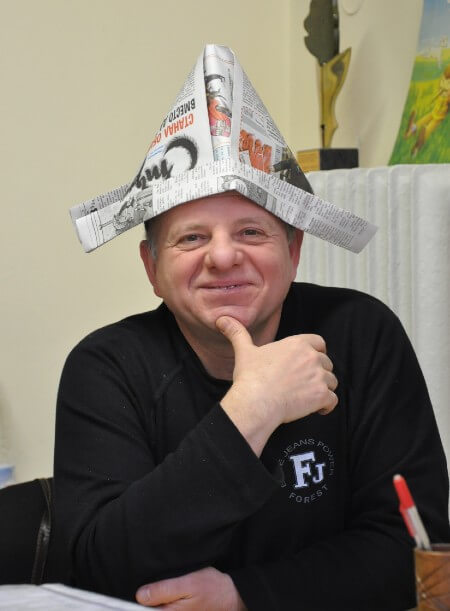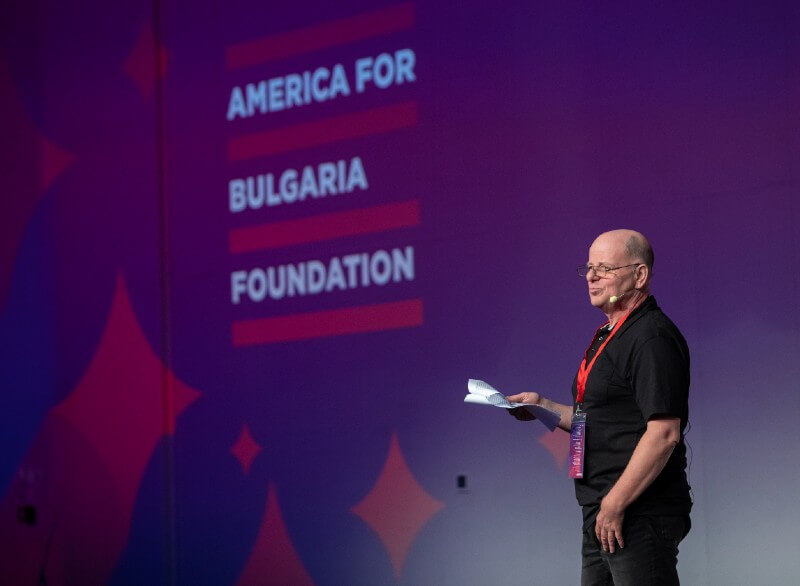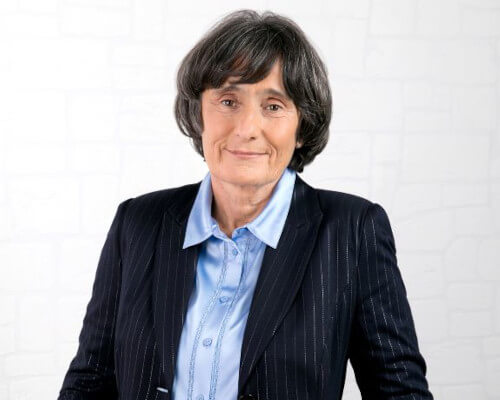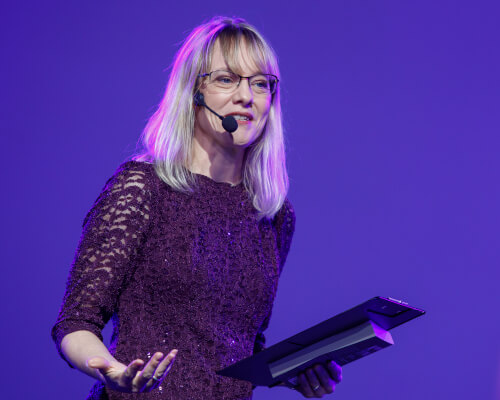
If there were castes in humor, Starshel (“Hornet”) newspaper would be nobility, and its editor-in-chief, Mihail Veshim, would now be celebrating a jubilee.
Mr. Veshim would probably blush at the elite analogy, preferring self-effacing presentations instead. At Starshel, he says, he began as “a jack of all trades, supplier of quality alcohol, party organizer, and chauffeur to the editor-in-chief. He is currently editor-in-chief and chauffeur to himself.”
After four decades at Bulgaria’s oldest and best-loved newspaper and twenty at its helm, Mihail Veshim truly is an institution. He has also authored more than 20 books, hundreds of short stories, humorous performances, radio and theater plays, and television scripts. His work has been translated in dozens of languages and featured in an anthology of world humor. His bestselling novel The English Neighbor was adapted for the screen in 2011.
Mr. Veshim’s and his newspaper’s contribution isn’t just to humor, though. With independent journalism in Bulgaria under attack, he and the other Hornets, as the newspaper’s staff is known, stepped in long ago to tell uncomfortable truths to power. Its editorials on the judicial system, politics, and the state of Bulgarian media are incisive and memorable.
We talked to Mr. Veshim about the role of humorists today, about social media, about real and pseudo patriotism, and about staying true to oneself.
America for Bulgaria Foundation: Whom does humor reach today? Is it easier or harder to make people laugh in a democracy or in a totalitarian regime?
Mihail Veshim: I want our humor to reach thinking readers. Our messages, mine and the other Hornets’, are addressed to them. Our unforgettable colleague Yordan Popov — may he rest in humorous peace! — liked telling the following story: He was wandering around the port of Sozopol wearing a hat that said “London” on it. A boatman yelled at him, “Hey, London, I will give you a ride!” And Yordan told him, “Just call me Jack!” Passersby laughed at the joke, but the boatman remained serious. Because he didn’t make the connection between London and Jack; he hadn’t heard of Jack London.
To understand humor, one must have some culture, some intelligence, and that is acquired through books. My books are intended for such readers, and such are the readers of Starshel. It is clear that it cannot be a mass newspaper; we gave up on that idea immediately after November 10 [1989, considered to be the start of Bulgaria’s transition to democracy and market economy, ed.], when the yellow newspapers appeared and attracted a mass following. We chose to stay true to our ideas and principles instead of catering to mass tastes. The latter is what television shows did, especially “Cuckoo” and then “Slavi’s Show.” I have been their untiring critic ever since they appeared because I do not like their crudeness and vulgarity. This is not humor; this is kitsch in humor. These shows brought kitsch to music and now to politics.
Before the changes, humorists’ aim was to outwit party censorship, to find a way — through hints, allegories, and Aesopian language — to say things about society and human beings that we were not allowed to say. This was done by Valeri Petrov, Radoy Ralin, Boris Aprilov, Marko Ganchev, Stanislav Stratiev, and many others of that generation. They did it well because they had talent, and talented people can hardly be stopped by censorship. You can burn their books, not publish them, but they will still find a way to say what they think.
Mediocrity rules the day today. Authors cater to mass tastes; they are kings of the cliché, of banality. That’s why I can’t watch comedy talk shows, shallow theater comedies, or TV sitcoms with laughter tracks. What is difficult now is that mass tastes have brought compromise to the fore. To attract audiences onstage or to the screen, otherwise talented actors dummy down their performances instead of being themselves… The same goes for authors.
ABF: Your books and commentary in Starshel newspaper are both funny and serious, and sometimes sad. Is the humorist’s job only to make people laugh?
M.V.: I sometimes bristle at the idea of Starshel being the most serious newspaper! I don’t want it to be that way; on the contrary, I want Starshel to be tongue-in-cheek, entertaining, bohemian, in the fashion of Balgaran [a popular early twentieth-century humorous newspaper, ed.], for example. But, increasingly, we have to be serious because other newspapers aren’t. We have to defend our democratic, pro-European, liberal values deliberately and consistently, unlike other publications, whose values change with the political winds… We have to do political satire every week, to write directly rather than in a fun and entertaining way, because we feel that democracy in Bulgaria is under threat. Our European orientation is under threat. Starshel readers expect our reaction to what is happening in politics; that’s why they buy our newspaper or read it online. Sometimes we are told: you write what we are thinking… What greater recognition is there!
After so many years of writing satire and feuilletons, I want to write other things, not so much related to current politics or to our endless Bulgarian troubles. Sometimes I wonder: What do Swiss humorists write about, living carefree in their orderly and peaceful country? I don’t think they write about anything because I don’t know the name of a single Swiss humorist. I know brands of Swiss watches and chocolates, names of banks and companies, but not of humorists.
ABF: What is humorists’ role in the age of oversharing?
M.V.: The age of social media, when everyone is a commentator, journalist, author, humorist… Although it is a waste of time, I sometimes entertain myself reading comments on Facebook. Coming across posts written with a sense of humor makes me laugh and fills me with some optimism that we Bulgarians are not a nation of whiners but are capable of going through life without taking it so seriously.
But humorists and pranksters on social media are a little suspicious to me. I can’t be sure that what they’ve written is theirs, that they haven’t “borrowed” it from someone. There is no copyright on social networks; everyone can take what they want and present it as their post or opinion. You don’t know whether the person behind the profile is real either.

Some time ago, a stranger created a profile with my name and photo and started posting at his heart’s content — about reading books about the afterlife and the supernatural, about liking Julio Iglesias. I am interested neither in the afterlife nor in listening to Julio Iglesias. But many of my friends (real, not virtual) thought it was me and befriended this person on Facebook. Thankfully, this fake Veshim does not make political statements. Imagine if he was a supporter of some pro-Putin politician? Go explain that I’m not him! We reported him, but his profile was not blocked… So, I had to create a Facebook account (I didn’t have one before because I didn’t want to go to the trouble) and explain which of the two profiles is the real one.
The presence of web humorists and pranksters doesn’t bother professional authors. In fact, it may even help them because Facebook users are different: they don’t buy newspapers; they only read posts. So, when someone posts one of my texts, I am always surprised at how many times it is read and commented on. I don’t need such passing fame, but I welcome every reader. If someone comes across a text of mine by chance and enjoys it, they may pick up Starshel or one of my books.
ABF: What motivates you and your colleagues to keep publishing Starshel, without compromising on the quality or breadth of topics, given how challenging it is for a newspaper to survive nowadays?
M.V.: Starshel is Bulgaria’s oldest newspaper, published since February 1946, without changing its name or temperament. There have been different periods in its history, some of them quite dark. Before November 10, it was published by the Central Committee of the Bulgarian Communist Party, and this determined its content. The truly free period of Starshel’s history began in 1990, when we managed to break free from our dependence on the BCP/BSP, because the national weekly for humor and satire should not be party property. I can say that no one has exerted pressure on our content or dictated our editorial policy ever since. We are not dependent on parties or economic groups. We are grateful to the America for Bulgaria Foundation, which has supported several of our projects over the years. For us, this assistance is very important. And more importantly, the aid is unconditional, with no strings attached; it is support for Bulgaria’s independent media.
But our main support comes from our readers. The newspaper has survived over the years thanks to them. You have no idea how loyal our readers are, both here in Bulgaria and abroad. Our newspaper is distributed online on five continents, and Bulgarians abroad write to us to tell us that Starshel gives them the most accurate picture of the situation in Bulgaria, that even our cartoons “Without Words” tell them more than some information sites.
Starshel survived also because of our stubbornness — mine and my colleagues’. The newspaper became a cause to champion over the years. I don’t know for how long. We don’t make long-term plans; we work week to week, issue to issue… We are playing “game to game,” as the philosopher Hristo Stoichkov used to say. We will go as far as we can.
I read somewhere that if the last bee on the planet disappeared, humankind would disappear after a year or so, too. Our Hornet’s disappearance wouldn’t affect humanity, but I am sure that Bulgaria would become a duller place to live without it.
ABF: Which challenge gets to you the most? And what gives you optimism at work?
M.V.: What gets to me the most is the stupidity and vulgarity around us, in their various forms — in our everyday lives, on the road, behind the steering wheel, in our media, in parliament, in the streets… Sometimes, even in the theater hall, stupidity is sitting next to you munching popcorn, drinking soda, loudly heckling the actors onstage. Because of such spectators I no longer go to the theater.
My encounters with stupidity are so depressing sometimes that I want to cry out, like [the poet Hristo] Botev did: “And to think that I set out to die for this people!”
But since I am no Botev, nor am actually sacrificing myself for this people, I dispel the dark thoughts and look for the humor in life. One funny incident a day, a joke I have thought of, or a one-liner that buzzes in my head like a hornet — this is enough to charge me with optimism.
ABF: Fake news is a special object of your sharp pen. How do you explain its popularity? And how do you practice good information hygiene?
M.V.: Polish satirist Stanislaw Jerzy Lec is the author of the aphorism “Every century has its Middle Ages.”
For many of my compatriots, the twenties of the twenty-first century are a dark age. According to the statistics, 60 percent of Bulgarians believe in white or dark magic. Then there are those who believe that the earth is flat and that airplanes fry our brains. They distrust scientists, progress, medicine, vaccines. “You people of learning are very stupid!” a know-it-all from Pancharevo used to say, and, as a child, I thought it was funny. Nowadays, a large number of Bulgarians believe that “scientists are very stupid” and are trying to wipe out humanity.
What are we to do in this dark age, when rumors and manipulations spread at the speed of light on social networks?
After it, the twenty-first century must surely give rise to a new Renaissance, a new Enlightenment. Where are the new Enlightenment figures, though, the true authorities?
There is no universal cure for this diseased information environment. One antidote is a healthy common sense, but that sense is neither very healthy nor very common among Bulgarians.
A satirist’s job, as I see it now, is to penetrate the thickest heads, graft some reason onto them, and see if a new shoot of common sense would sprout… It’s a tough job.
ABF: Starshel is among a handful of Bulgarian-language publications offering both grammatically correct and engaging, unclichéd language to its readers. Is this part of your editorial policy? What is your personal relationship to language?
M.V.: Language is a sensitive subject for me; it really pains me to see what’s happening to ours… I have written dozens of articles on the subject. I have been given cause by publications in the media, politicians’ statements, the babbling of the so-called elite. Thirty years ago, our language was full of Russian words, now it’s full of English words. No one uses the Bulgarian words for “begin” and “end” anymore; everyone “starts” and “finalizes” things… Foreign borrowings are everywhere.
But even more annoying to my writer’s ear are acronyms. A hospital in Bulgarian is abbreviated to MPHAT. Say it out loud. Doesn’t it sound like a cussword or an auto-insult? It stands for Multi-Profile Hospital for Active Treatment. Why active? Does anyone hope for passive treatment? What if the hospital has a single profile? What would the abbreviation sound like then? The bureaucrat’s ear doesn’t catch these nuances, but a writer has a sensitive ear and reacts instantly. I have frequently written about this. To no avail!
I have also repeatedly spoken out against Askeer, the name given to our national theater awards, which are given out on May 24 [the day of the Cyrillic alphabet, ed.]. Asker is an old word for a Turkish soldier, and in Bulgarian memory, this term does not evoke positive associations. Imagine if Poland’s biggest theater award was called Soldat [the Russian word for “soldier,” ed.]? I understand that the name Askeer tries to parody Oscar. I know a thing or two about parody, but this is poor, inappropriate parody. At Starshel, we have been proposing for years that this absurdity is replaced with Voyskar [from the Bulgarian word for “army” — voyska, ed.]. This way, it would at least be in Bulgarian and have some connection with the Theater of the Bulgarian Army, which gives out the awards. Although, where else do you have a theater of the army? In Moscow and probably in North Korea…
You see how one question generates many other questions and so many things to write about. At the beginning of my career in satire, I was convinced that you could fix the world by writing. Now I know that that’s not true. But it’s worth trying.
ABF: Patriotism is closely related to the subject of language, so let’s talk about that. Many political (but not only) formations have appropriated the patriot label and denounce anyone holding opposing views as unpatriotic. How did we get here?
M.V.: Patriotism in Bulgaria has atrophied and metamorphosed into showy kitsch. Young men tattoo the faces of Tsar Simeon the Great and Krum the Fearsome on their calves, Paisius of Hilendar on their biceps, and Rakovsky on their triceps [the first two are medieval rulers of Bulgaria, while the latter two are figures of the Bulgarian National Revival movement of the eighteenth and nineteenth centuries, ed.]. There are way too many of these historical reenactments, and they go way overboard: guns are fired, young hotheads shake fists at the imaginary tyrant, and later “the fire of rebellion” is quenched at the pub… On my street, Krastyo Sarafov, in Sofia, one such showy patriot had the faces of Levsky and Botev painted on his garage doors. Other garages have “No parking” signs; his has none other than Bulgaria’s greatest revolutionary figures watching for improper parking… Isn’t that the kitsch that thinkers such as philosophy professor Ivan Slavov warned against? Even so, TV networks glorified this garage patriotism instead of analyzing and condemning such poor taste. Only Starshel did that. Who knows how many understood the message…
Pseudo-patriotism is ever topical in Bulgaria, especially in politics. We have “stung” many a pseudo-patriot cashing in on their “love” of the Motherland. Just like today’s opponents of the euro, who are trying to frighten us that the European currency will take away the sovereignty of our poor lev but whose personal bank accounts turned out to be in euro…
Patriotism for me isn’t something you show off with; it isn’t a “Bulgaria on three seas” T-shirt. Being patriotic is working, studying, and improving yourself daily so you can help your country’s progress; it’s living honestly and with integrity and leading by example.
Honest Bulgarians who do not make empty noise — these are the real patriots for me. The rest is pretense and kitsch.
ABF: Bulgarians abroad are a frequent target of your satire. How do they provoke your artistic imagination?
M.V.: Ever since Aleko Konstantinov wrote Bay Ganyo a hundred years ago, all satirists have been developing the eponymous character, which Aleko bequeathed to us. Every author since Aleko has been writing a sequel to Bay Ganyo of sorts, as much as their strength and creativity would allow. Bay Ganyo [a brutish, ignorant man convinced of his superiority over other nationalities, ed.] is more alive and stronger than ever, and so are his actions. Understandably, Aleko Konstantinov could not anticipate what Bay Ganyo would be like in the future – as a driver, as a banker, as a soccer team owner, or a soccer player of international renown… He couldn’t have predicted that his character would become a drug trafficker in the Dominican Republic or would be involved in siphoning off funds from the Dutch welfare system. Have you thought about the female equivalent of Bay Ganyo; let’s call her Ms. G or Lady Gana. There are so many real-life examples to inspire the creative mind… We have Bay Ganyos galore and not enough Alekos.
ABF: In your books and TV scripts and on the pages of Starshel, you examine Bulgarian mores, particularly our propensity for division and discord. We have been divided over so many things for so long, yet some claim these divisions really boil down to the division between pro-Western and pro-Russian forces in the country. Would you agree?
M.V.: The poet and satirist Dimitar Podvarzachov summed it up best a hundred years ago in an aphorism: “The Bulgarian people have not had enough of unfreedom.” Anyone who turns their back on Europe today and pines for Eurasia really has not had enough unfreedom…
ABF: Many people are attempting to mask their position on the war in Ukraine as a “middle ground,” as neutrality. Can we be neutral in this situation?
M.V.: What neutrality? Isn’t it clear who the aggressor is and who the victim is here? On whose territory is the war being fought? Whose cities are Russian missiles destroying, whom are they killing? What are the millions of Ukrainian women and children running away from?
To speak of neutrality in such a war means that you justify the crime and the onslaught of barbarism against civilization.
ABF: Is life possible without humor?
M.V.: There are people who can live without humor. I can’t. Humor is like air to me; if there is none, I’d suffocate.

